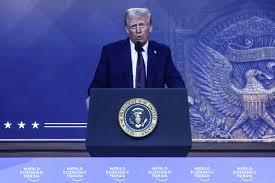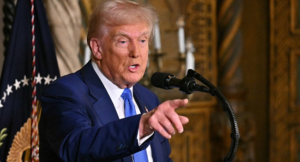
U.S. President Donald Trump told business leaders at the World Economic Forum in Davos, Switzerland, that he wants to lower global oil prices, interest rates and taxes, and warned they will face tariffs if they make their products abroad.
“I’ll demand that interest rates drop immediately. And likewise, they should be dropping all over the world,” Trump said via video conference on Thursday.
“I’m also going to ask Saudi Arabia and OPEC to bring down the cost of oil.”
The remarks were the first of Trump’s four-day-old presidency to global business and political leaders at a time when markets are on edge over his plans for broad tariffs on imported goods.
Oil prices turned negative as Trump spoke, while the euro dipped and the U.S. dollar swung between gains and losses against a basket of foreign currencies.
Some of his harshest criticism was reserved for traditional U.S. allies Canada and the European Union who he threatened again with new tariffs, while berating their import policies blaming them for the U.S.’s trade goods deficit with these partners.
“One thing we’re going to be demanding is we’re going to be demanding respect from other nations. Canada. We have a tremendous deficit with Canada. We’re not going to have that anywhere,” he said.
People cheered as Trump’s face appeared on the big screen. Trump, whose first elected office was the White House, listed the rapid-fire changes he had made since his swearing-in on Monday.
He also sharply criticizing his predecessor Joe Biden and policies that have dominated at Davos for years, from climate change policies to diversity. Former U.S. Secretary of State John Kerry, who served under Biden, visibly winced as he listened.
Trump promised to reduce inflation with a mix of tariffs, deregulation and tax cuts along with his crackdown on illegal immigration and commitment to making the United States a hub of artificial intelligence, cryptocurrencies and fossil fuels. He also criticized levels of taxation in the European Union.
“The United States has the largest amount of oil and gas of any country on Earth, and we’re going to use it,” Trump said. “Not only will this reduce the cost of virtually all goods and services, it will make the United States a manufacturing superpower.”
The Davos forum gave a handful of business executives an opportunity to publicly question the president on issues that affect their businesses, or in some cases their specific investments, projects and interests.
Trump repeated a string of familiar falsehoods – that the U.S. had the cleanest air and water during his first term, that he won by a large mandate in the United States, that there was a “Green New Deal” in the U.S. that he had repealed.
The business leaders included Bank of America (BAC.N), opens new tab CEO Brian Moynihan and Blackstone Group (BX.N), opens new tab CEO Stephen Schwarzman as well as TotalEnergies (TTEF.PA), opens new tab CEO Patrick Pouyanne, WEF CEO Borge Brende and WEF founder Klaus Schwab.
More than a thousand executives, officials and others from around the world filled the main hall at the convention for Trump’s speech, including Polish President Andrzej Duda.
Business leaders are eager to hear more about Trump’s concrete plans on tariffs after he threatened broad import duties and suggested they could start on Feb. 1.
Trump has moved quickly to crack down on immigration, expand domestic energy production and has threatened to impose steep tariffs on the European Union, China, Mexico and Canada.
Trump has also withdrawn the United States from the World Health Organization and the Paris climate agreement. He says he will rename the Gulf of Mexico as the Gulf of America, though other countries may not adopt the new name. He has also threatened to take back the Panama Canal from Panama.
He has pardoned more than 1,500 supporters who attacked the U.S. Capitol on Jan. 6, 2021, in a failed effort to overturn his 2020 election loss, drawing outrage from lawmakers and police whose lives were put at risk.
Trump is moving to dismantle diversity programs within the U.S. government and is pressuring the private sector to do so as well. That has left some in Davos searching for new words to describe workplace practices that they say are essential to their businesses.







